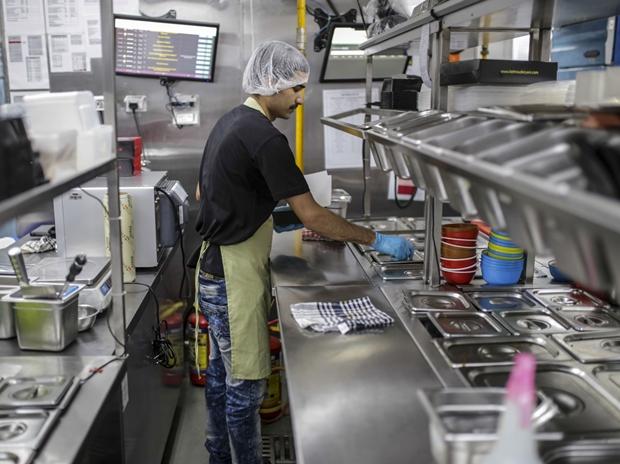Wendy’s Co. has struck a deal with India’s Rebel Foods to open about 250 so-called cloud kitchens across the country, one of the most ambitious efforts yet to serve customers through delivery rather than the traditional fast-food stores as the industry adapts to the coronavirus pandemic.
The US company is experimenting with a new format as the Covid-19 outbreak makes many consumers unwilling or unable to visit traditional stores. Cloud kitchens, which derive their name from cloud computing, are remote facilities without seating or cashiers that prepare food exclusively for delivery.
Wendy’s, with nine brick-and-mortar outlets in India, said it believes its cloud kitchen alliance is the largest yet in the industry. Rebel Foods, backed by Sequoia Capital and Goldman Sachs Group Inc., is the world’s largest cloud-kitchen operator with more than 300 locations.
“India is one of our high-growth, high-potential markets,” Abigail Pringle, Wendy’s chief development officer, speaking via video conference from the chain’s headquarters in Dublin, Ohio. “I don’t know of any other global brand that has announced this kind of significant multiyear, multi-unit commitment.”
As lockdowns and social distancing disrupt their business models, fast-food chains are experimenting with a variety of ways to adapt. With deliveries surging, many recognize their existing stores aren’t the optimal way to meet demand and have turned to cloud kitchens, also known as ghost or dark kitchens. Chains like Chili’s, Applebee’s and Chipotle have already set up their own delivery-centric virtual locations.
Wendy’s push in India appears to be the largest cloud-kitchen outsourcing deal announced yet, based on the number of locations. Leading startups such as CloudKitchens and Virtual Kitchen, which work with a range of brands in the U.S. and abroad, have fewer than 100 sites. One fast-food operator in Thailand said it plans to open 100 cloud kitchens within five years.
Your Next Favorite Restaurant Might Not Be a Restaurant
Wendy’s, with 6,800 restaurants in 30 markets worldwide, followed rival burger chains like McDonald’s Corp. into India, opening its first restaurant in New Delhi in 2015. It plans about 150 physical stores over the next decade, in addition to the cloud kitchen push. Sierra Nevada Restaurants, the chain’s franchise partner, will help with both initiatives.
“India is one of the most under-penetrated markets on earth” for quick-serve restaurants, said Jasper Reid, managing director of Sierra Nevada.
Wendy’s, once known for its “Where’s the beef?” tagline, has particular challenges in India, where the majority of citizens worship cows as sacred. Its local menu items include chicken chili, masala fries and the best-selling 69-rupee ($0.93) bun tikki, a spicy potato cutlet served between two burger buns.
Rebel Foods, co-founded by former McKinsey & Co. alum Jaydeep Barman and his INSEAD business school classmate Kallol Banerjee, helped pioneer the cloud kitchen concept. The duo operate their own restaurant brands and are expanding into outsourcing for chains like Wendy’s. With money from Uber Technologies Inc. co-founder Travis Kalanick, along with Sequoia and Goldman, the company has grown to hundreds of kitchens across countries including India, Indonesia and the U.K.
Leveraging the fixed costs of tightly packed, centralized kitchens, it serves far-flung customers who have no idea where their food is prepared. With space-saving, stacked kitchens located in low-cost sites like industrial complexes or side alleys, its model helps side-step the costs of running traditional restaurants with seating and wait staff.
McKinsey Alum Turns Failed Restaurant Into $535 Million Startup
The pandemic has accelerated the adoption of food delivery around the world. In the U.S., deliveries now account for more than 5.5% of Wendy’s overall business, while they’ve reached 11% in Canada.
“For generations, brands building a national presence relied solely on a brick-and-mortar strategy and made significant investments over decades,” said Banerjee on a video conference call. Cloud kitchens are aimed at helping chains expand “at far lower levels of capital.”
 Dear Reader,
Dear Reader,
Business Standard has always strived hard to provide up-to-date information and commentary on developments that are of interest to you and have wider political and economic implications for the country and the world. Your encouragement and constant feedback on how to improve our offering have only made our resolve and commitment to these ideals stronger. Even during these difficult times arising out of Covid-19, we continue to remain committed to keeping you informed and updated with credible news, authoritative views and incisive commentary on topical issues of relevance.
We, however, have a request.
As we battle the economic impact of the pandemic, we need your support even more, so that we can continue to offer you more quality content. Our subscription model has seen an encouraging response from many of you, who have subscribed to our online content. More subscription to our online content can only help us achieve the goals of offering you even better and more relevant content. We believe in free, fair and credible journalism. Your support through more subscriptions can help us practise the journalism to which we are committed.
Support quality journalism and subscribe to Business Standard.
Digital Editor

RECOMMENDED FOR YOU